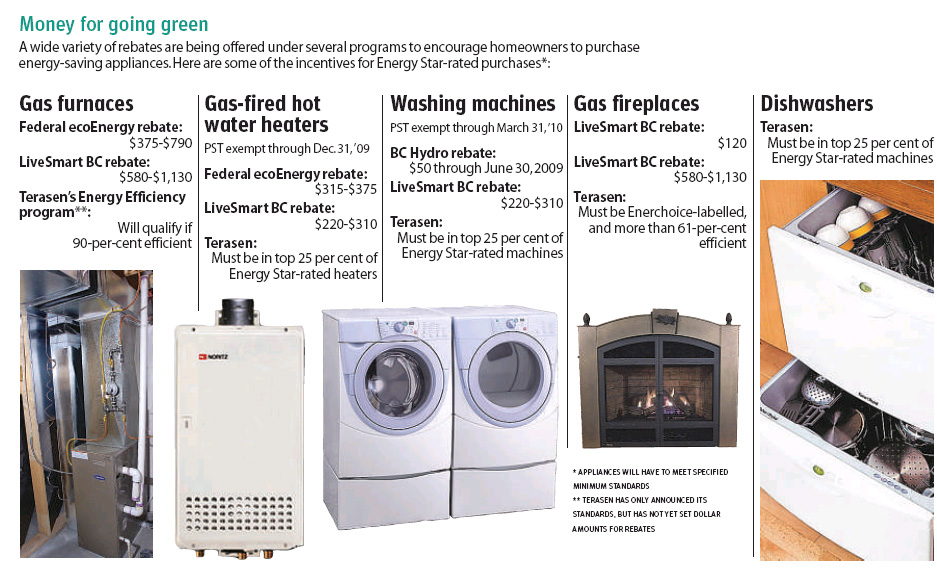Utility hopes to transform the way consumers think about purchases
Scott Simpson
Sun

* Appliances will have to meet specified minimum standards ** Terasen has only announced its standards, but has not yet set dollar amounts for rebates Utility hopes to ftransform the way consumers think about purchases
Save energy, save money. Even before Terasen Gas announced a new set of rebates this week for energy-efficient appliances, consumers were awash in incentives to help curtail greenhouse gas emissions.
Buy a high-efficiency hot-water heater, for example, and your purchase can qualify for a federal ecoEnergy rebate, a LiveSmart BC rebate, and even a PST exemption.
Depending on the model you purchase, you could recover $2,000 or so on the purchase of a gas furnace — and that’s not including Terasen’s pending offers, or any manufacturers incentives that may be available.
Potentially, that’s five different cash rewards on a single purchase.
Gas furnaces are typically the big-ticket items in the home appliance realm, and Terasen has in the past made periodic rebate offers.
This time around, however, the province’s biggest gas utility has a long-term plan and is looking to fundamentally reshape the way consumers think about purchases of many home appliances that rely on natural gas.
In a ruling handed down this week, the British Columbia Utilities Commission accepted Terasen’s proposal to spend $41.5 million on a new three-year energy efficiency and conservation program that includes rebates, public education campaigns, and even a program directed specifically for low-income customers.
Earlier programs have cost in the range of $3 million a year and were exclusively focused on rewarding purchases by commercial and residential customers of high-efficiency furnaces and boilers.
“We’ve always had energy-efficiency programs, but on a small scale in our business, so probably I think between the utilities around the province, $4 million a year was all we’ve had,” Doug Stout, Terasen vice-president for marketing and business development, said in an interview.
“The programs we offered could be targeted for a short duration. For example, you’d have a two-month window.
“In reality, people can’t plan around those kinds of things and we needed to have programs that were longer-term so you would be able to plan how you are going to invest your money.”
The expanded program also includes rebates for water heaters, gas fireplaces, dishwashers and washing machines — all of which rely on gas — and will be available for both new home installations and retrofits in existing homes.
There is already a mixed bag of rebates available on those appliances, but if you’re looking to capture as many rebates as possible, keep in mind that not everything with an Energy Star label will qualify.
In fact, most won’t meet the standard Terasen is asking consumers to look for.
Sarah Smith, head of energy-efficiency programs for Terasen Gas, said the utility is looking at incentives for “the most efficient Energy Star dishwashers and washing machines — the top 25 per cent of performers — and we are looking for the top 25 per cent of performers in water heaters.”
Gas fireplaces will need an EnerChoice designation.
Funding for the program will be derived from a small annual increase to gas rates — about 42 cents a month for an average residential customer — but Terasen notes that people who take up the rebate offers “can realize potential savings of hundreds of dollars per year.”
Terasen estimates that the program will allow customers with more efficient appliances to cumulatively forego $100 million in natural gas purchases and cut 500,000 tonnes of greenhouse gas emissions along the way.
That’s equivalent to taking 3.7 per cent of cars and trucks off the road in B.C., Terasen president and CEO Randy Jesperson noted in a statement.
© Copyright (c) The Vancouver Sun

